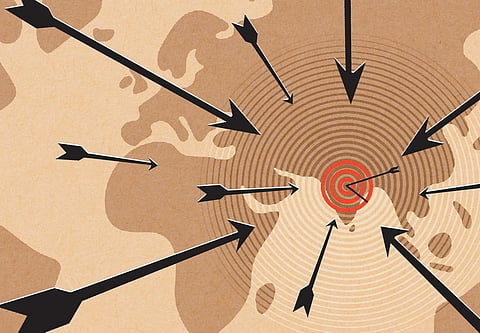

To be honest, we are more than a bit confused by what has been reported in the past few days. The country has assumed the chair of G20 for a year and this, we are told, will allow it to become the Voice of Asia, Africa and Latin America. In 12 fleeting months, international relations will be transformed. How can any Indian not take pride and rejoice patriotically in this great achievement?
The only problem is that this position is purely rotational and cannot be, by any stretch of the imagination, projected as a special recognition of India's power and prowess or exceptional economic performance in trying circumstances.
The baton changed hands in Bali an island in Indonesia that has preserved its Hindu identity in a nation that has the largest Muslim population in a country. Our PM has a unique way of discovering connections and coining acronyms. But as the G-20 summit wasn't a bilateral interaction, he wisely didn't dwell on ancient cultural ties that bind us to Indonesia. It was a little later that Narendra bhai talked of the philosophy of Advaita that can cure the ills that make our life miserable, fostering a sense of Unity in a painfully divided world. Vasudhaiva kutumbakam, it seems, has reached its expiry date as an inspiring exhortation.
To some, it may appear nitpicking, but isn't Advaita an abstract concept for everyone -- even Indians --to grasp? Adi Shankaracharya, who propounded it, also formulated that Satyam brahm jagat mithya, (the world is an illusion and Brahm, only the eternal cosmic being, inseparable from the individual soul, is real). Maya -- the illusion -- is merely a construct of the human mind.
What is even more intriguing is the choice of Advaita that immediately triggers a chain of thoughts regarding vishishtadvait and dvait -- its off-shoots. Vedanta itself is one of the six schools of Indian philosophy rooted in the Vedas.
Does this signal a shift from material to spiritual in the next phase of Indian diplomacy? Contemporary international relations are, indeed, fraught with painful and serious sectarian divides -- Christianity vs Islam, Jews vs Islam and the Indo-Pakistani face-off are also often distorted into a battle between the Hindus and Muslims.
The ruling party's discomfort with religious conversions and 'love jihad' doesn't exclude a conflict between the Hindus and Christians, either. In Afghanistan and Iran, the fratricidal war between Shia-Sunni hasn't ceased. Xinjiang province of China has witnessed, for years, violent clashes between the Muslims and 'godless' Communists. Buddhists persecuted by the Chinese have turned their wrath against non-Buddhist Rohingyas in Myanmar, and Japan is troubled at the moment about late Prime Minister Shinzo Abe's relations with a controversial church that is viewed with suspicion by many as an opaque cult.
The list is endless. Can Advaita be prescribed as a panacea for all the strife? Can all else -- racial and ethnic discord, legacy problems of the Colonial rule or medieval dominance of Turko-Afghans -- be sidelined?
One can't help pondering the implication of prioritising Advaita over other philosophical concepts in the domestic context. What does this imply for diversity? Can glaring economic chasm be dismissed as maya? Illusion and reality, and the universal truth are concepts like a sharp double-edged sword. An expert ambidextrous fencer like our PM may wield them dazzlingly on the international stage, but in the hands of less-skilled followers at home (and abroad), they can cause immense collateral damage.
There has been much action worth noticing and commenting on elsewhere. First, the 'national shame' inflicted on hosts by the chair of the international jury at the International Film Festival of India. For a nation that claims to be not only the largest democracy in the world but the 'Mother of Democracy', those who rule us display a very thin skin when master's voices are criticised.
Otherwise, they seem to have a hide harder than a rhino. No one can deny that the genocide of the Kashmiri Pandits was a crime against humanity and the guilty having been allowed to roam unpunished is certainly a matter of national shame. Governments at the Centre and in the state, past and present, have much to answer for.
The Hindu Pandit refugees continue to live in unacceptable conditions. This, however, does not transform The Kashmir Files into a masterpiece. In any case, 'artistic work' evokes diverse responses. The manner in which the poor Israeli ambassador was drawn in to defend the indefensible only exposed the hollowness of our claims to be a mature democratic polity that has space for dissent and difference of opinion.
Trying to isolate the chair proved even more rattling. Except for the Indian member, all others have come out in support of the Israeli filmmaker, who had called the controversial film "vulgar partisan propaganda".
Ravish Kumar’s resignation from the NDTV provided another distraction that upstaged much-hyped electoral roadshows in Gujarat. The anchor's YouTube channel gained nearly a million subscribers in a day. The credibility of the individual today far outweighs the institution. Be it the media, the Supreme Court or the Election Commission.
(Pushpesh Pant is former professor, Jawaharlal Nehru University. He can be reached at pushpeshpant@gmail.com.)